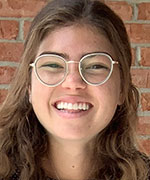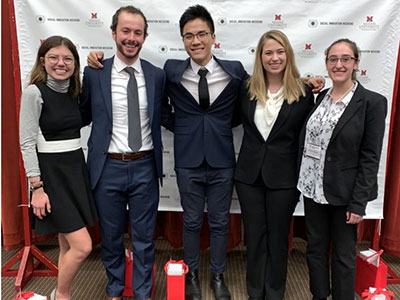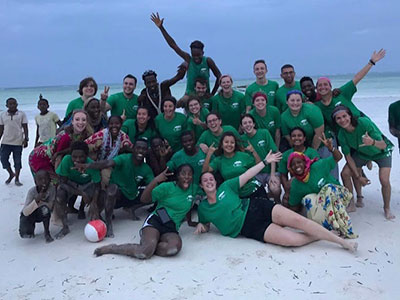
"I think it's so energizing to be a part of a generation that is truly pursuing sustainability and helping to set a new optimistic tone for the future. If you choose to study it, sustainability is going to be different from anything you have studied before, but it is a lot of fun."
Why Miami?
"My entire family has gone to Miami, and being the oddball of the family, I was worried that I didn't fit the traditional Miami character and might have difficulty finding the space for me. As it turned out, I was wrong! Freshman year was difficult finding my niche, but being able to join the Environmental Awareness Program Living Learning Community (LLC) about helped me find others with similar interests, including my roommate and now co-president of our club, Leaders of Environmental Awareness and Protection (LEAP).
"Soon after starting as a freshman, I also joined a bunch of green organizations on campus and felt really involved. Now, as the president of LEAP, I realized that within a large student body, you find your people. That is my favorite part of Miami, because there are so many different communities within the overarching community. There really is a place for everyone."
Best Miami Experiences

Olivia Ferrazza inside the market at Three Trees Farm
"Although I had been interested in the environment well before I applied to college, I started at Miami as a psychology major. I changed that during Welcome Weekend. By that time, I knew I wanted to go into nutrition. It was always in the back of my mind, but early on I just didn't know how to connect the dots between nutrition and the environment.
"During my first year at Miami, I was taking nutrition classes and exploring a sustainability co-major. But when I learned that there was a specific co-major focusing on food systems and food studies (FSFS), I immediately jumped right on it. This was the connection I was looking for! I always say that it is really cool to have both my major and co-major, because you learn not only what diet is supportive for human health, but what diet is supportive for the environment, and how those two diets overlap.
"It's powerful to have knowledge about both human needs and environmental needs. There are often people contributing to the food sustainability conversation with an expertise in sustainability or human nutrition, but not both. There are people in environmental science and sustainability that care about food systems, but they lack an in-depth knowledge on human nutrition — and the same goes with nutrition experts. I appreciate having knowledge in both, which became the thing I most love to study."
Miami and the Liberal Arts
"What I love most about my major and co-major is how well they fit together, especially because they share a lot of required classes. I am constantly sitting in my classes for my co-major, using things I have learned from my nutrition major, and vice versa. I enjoy constantly connecting the pieces between my studies, and realizing that I have a very unique perspective to bring to classes.
"As a college student, you are always trying to figure out what you are doing with your life, and sometimes it can feel like what you're doing isn't aligning with where you want to go. It is so easy to get confused, but it’s really cool to realize when everything is coming together. Everything outside of the classroom I do is aligned with what I am learning. My classes in the College of Arts and Science are especially very hands-on, which I love.
"Neither nutrition nor FSFS are things you normally study in high school. The nutrition major is similar to a combination of anatomy, physiology, and health class, but it certainly stretches beyond these concepts. It is hard to compare my FSFS co-major to high school classes, but I would say it is similar to biology or botany. However, the FSFS co-major is much more expansive than just a textbook or high school class. There is an element of currentness, because it is such an emerging field. Those who study sustainability are constantly pivoting and utilizing the most recent research. Something as static as a textbook couldn't do the topic as much justice.

Olivia Ferrazza (left) and fellow members of the Social Innovation Weekend winning team
"The co-major also has taught me which tools and sustainability journals to trust and what resources are out there as far as current research. For example, The Ohio State University is a land-grant institution, and they have lots of resources for farmers and data that you can pull from. Like I said, sustainability is far from a static practice, so learning the process of problem solving and the tools involved in problem solving is more valuable than memorizing facts that are likely going to be outdated within a few years. The skills I have gained are deeply part of understanding the professional world.
"Being able to engage with people in the field is one of the most important skills I have gained at Miami. FSFS is focused on connecting with people connected to food sustainability, whether that is on farms or food pantries. Last year, for example, I did a social innovation event that was all about food insecurity, where I was able to network with a multitude of people who care about the sustainability of food. My team ended up winning the competition, and I truly think the decision to do such an immersive weekend experience was a catalyst for career opportunities after I graduate. With my nutrition major, being able to shadow dietitians out in the field has helped me gain an understanding of the breadth of opportunities in the dietetic space, as well as to observe very technical parts of the job in action, such as writing clinical notes."
Developing Organic and Sustainable Techniques in the US and Abroad
"I've had two notable experiences outside the classroom related to my food systems and food studies co-major. Both of them have changed my life.
"For the first, I worked as a summer intern at an organic farm called Three Trees Farm, located in Dayton. I stumbled upon it by contacting several organic farms in the region and found out that the founders of Three Trees Farms, Kim and Matt Brown, just happened to be Miami grads!
"I spent the summers of 2019 and 2020 on the farm, and they were some of the enriching experiences I've ever had. I grew up in a suburban household and had never grown anything in my life. In fact, while I was growing up my family hardly even cooked. I had no connection to plants or food systems until I was able to learn how things grow in the ground. Kim and Matt were focused on the importance of teaching me, and I learned so much, covering everything I had studied in a classroom: germinating, transplanting, cultivating, harvesting, preparing produce for market, you name it — it has paid off a lot. It never felt like I was memorizing facts as you would in a classroom, and only now looking back do I realize how much I took from the experience.
"It was inspiring to see how the founders of the farm started it from scratch, too. They took a courageous step away from what they had studied at Miami, and now they are seeing the rewards of that risk. It taught me a few lessons, that it’s never too late to change directions, and it’s always worth it to lean into your passions. As a result of the experience, I know that whatever I want to do, I want to love it, and I want to be challenged by it.

Olivia Ferrazza (center) after playing soccer on the beach in Kairo, Zanzibar Island during her volunteer trip in Tanzania
"My second notable experience occurred this past winter, when I went on a study abroad trip to Tanzania. I spent a few weeks on Zanzibar Island, in the village of Kairo, followed by a few weeks in Arusha, before climbing Mount Kilimanjaro. We lived with locals throughout the experience, and I became very close to several members in the community. This volunteer opportunity was provided by an on-campus club called Growth International Volunteer Excursions, or GIVE. Everyone says this about their study abroad experiences, but it really changed the way I think about everything. I had never been outside of the U.S., and going on my own without my family felt like an important transition to adulthood.
"In Tanzania we did things related to my FSFS co-major, such as visiting the community's permaculture plot and working there for a few weeks. A permaculture plot is a very specific type of agricultural design, focusing on a systems approach that mimics natural ecosystems and prioritizes the sustainability of agricultural practices. I had never learned about permaculture before, so I cherished this experience very much! There was also a 'medicine man' who gave a class on natural herbs and medicinal plants that they use in their community, which was equally intriguing.
"Throughout my time in Tanzania, especially in the village of Kairo, I learned about how the people there handle their resources and dispose of their waste. Every resource is utilized thoughtfully, and waste is extremely minimal. Even something such as old roofs, that us Americans would deem as waste, are used as the brown component of compost in the permaculture plot. The whole experience was awesome, bringing a new perspective to my co-major. I went to volunteer halfway around the world, to work on sustainable infrastructure, and hear others' life experiences and understand their incredibly powerful life motto of 'tupo pamoja,' a Swahili expression that basically means 'we are together.'
"In addition to this, I left with tactical experiences that will make me a valuable part of my professional field. One of the biggest takeaways from the trip was that our 'first-world' way of doing things is not always the best. The people of Tanzania that I met were extremely electric individuals, they were happy with their lives, they were loved by their community around them. They are rich in ways we could never be."
Advice to Students
"I always hate giving advice to others. Everyone's on their own journey, and people often overlook the wisdom they have within themselves. Your own intuition will tell you a lot!
"I would advise that, while listening to your peers and inspirations is helpful, the comparison trap is real. Check in with yourself from time to time to make sure the effort you're putting into school and work is what you want, and you aren't running someone else's race. Of course, I would advise others to travel, to stretch out of their comfort zones, that's where real growth happens. Theres a lot to be discovered and to learn in this world! I think it's so energizing to be a part of a generation that is truly pursuing sustainability and helping to set a new optimistic tone for the future. If you choose to study it, sustainability is going to be different from anything you have studied before, but it is a lot of fun.
"Food systems and food studies is such a cool, growing co-major because it is ever-present in each of our lives. It can relate to any major. If you are interested in it, I urge you to do it. Miami is one of the few universities that offers this academic opportunity!"
[December 2020]
 Miami University Oxford, Ohio est. 1809
College of Arts and Science
Miami University Oxford, Ohio est. 1809
College of Arts and Science
 Miami University Oxford, Ohio est. 1809
College of Arts and Science
Miami University Oxford, Ohio est. 1809
College of Arts and Science